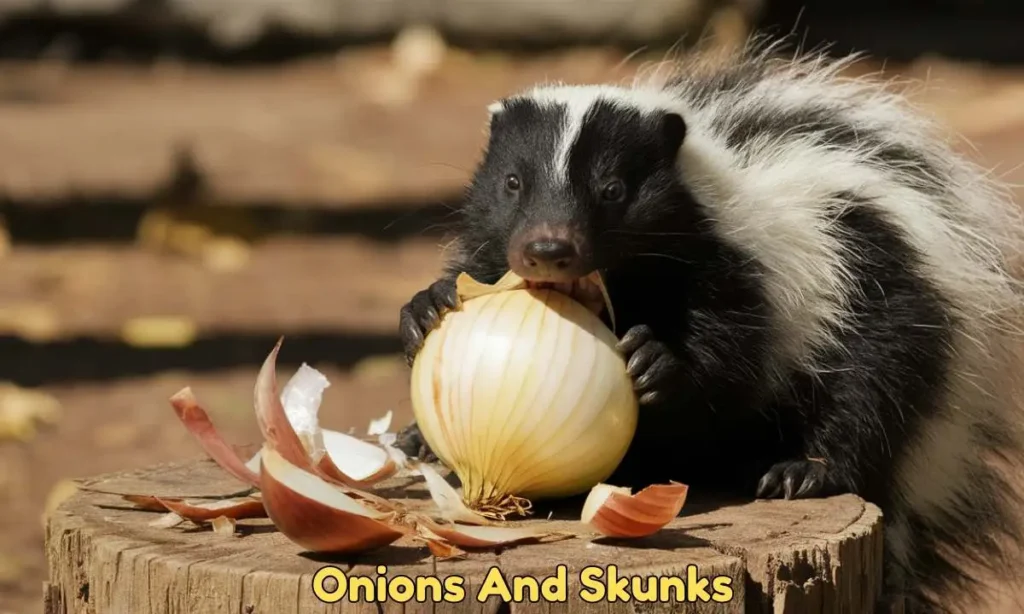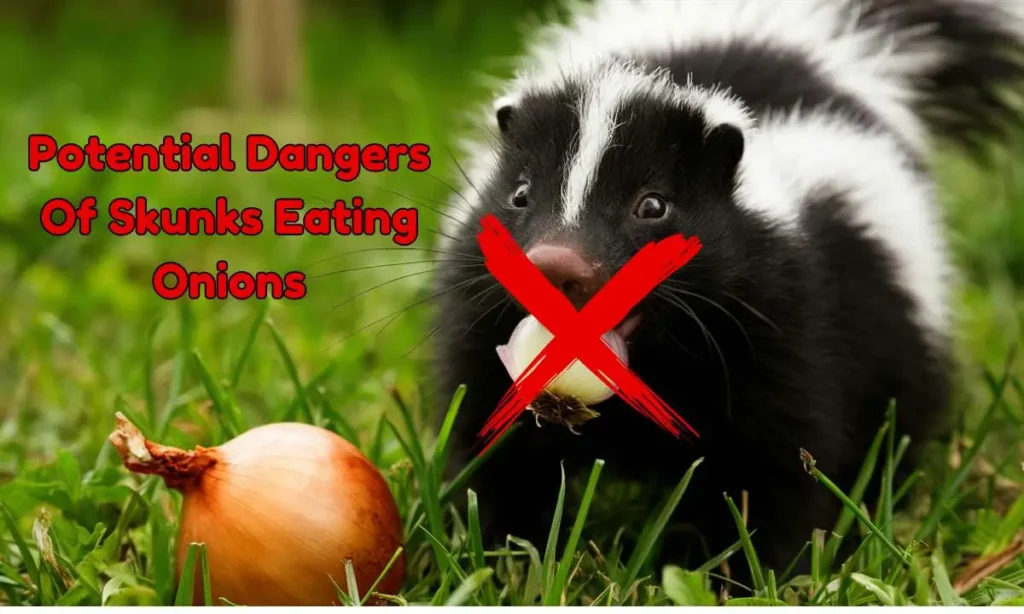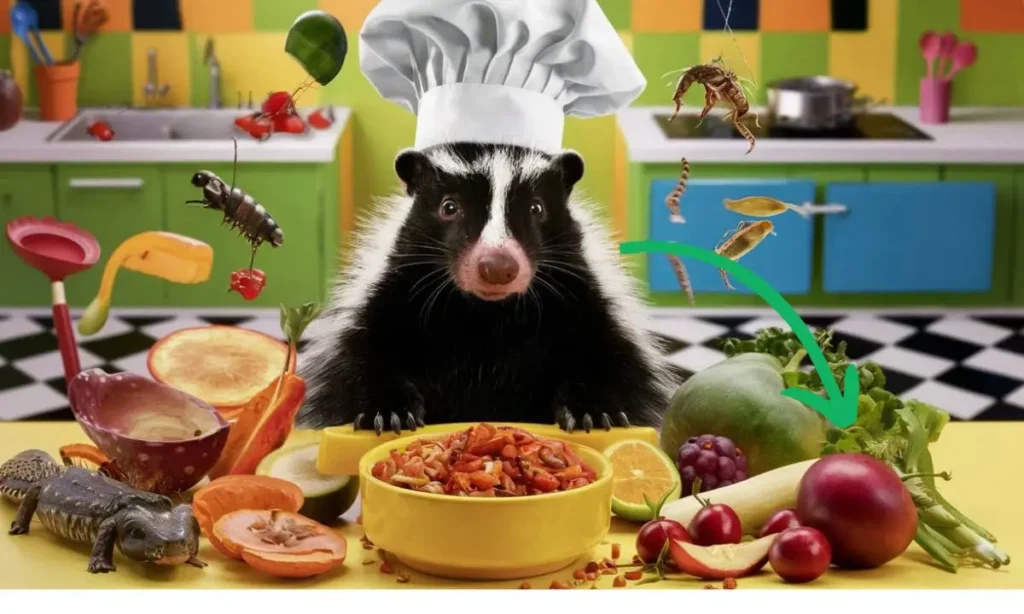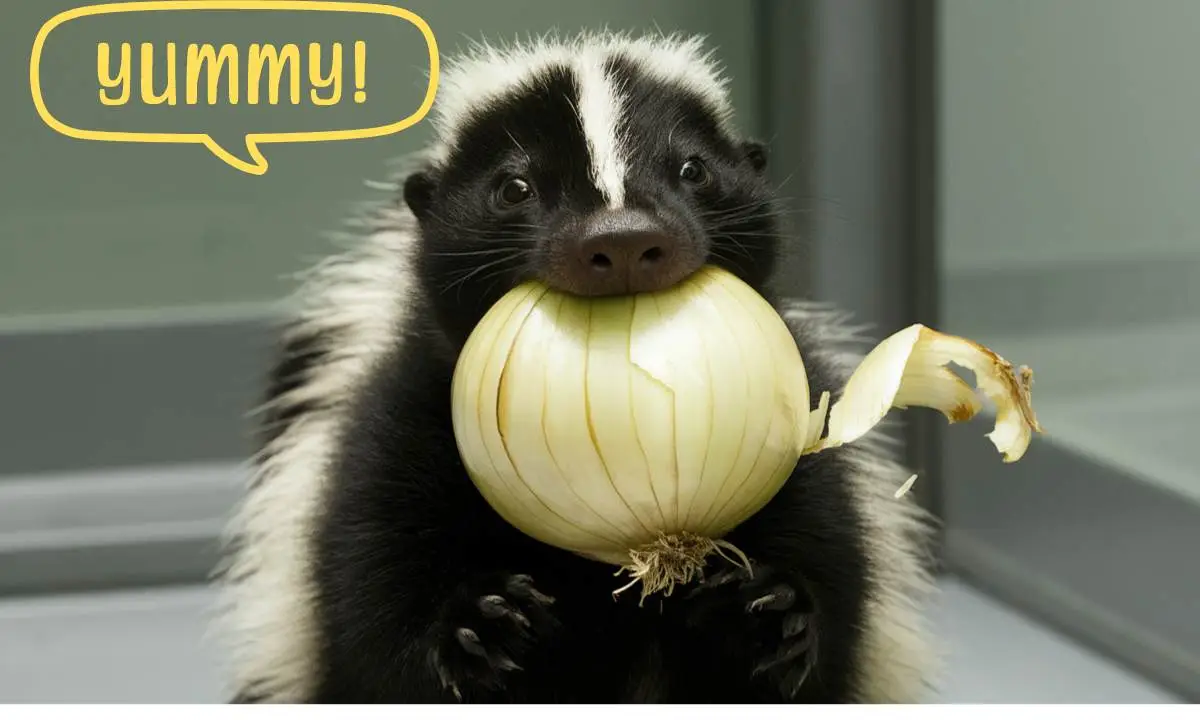Can Skunks Eat Onions? Risks and Facts
Last updated on November 4th, 2024 at 05:39 am
Yes, skunks do eat onions, even though they aren’t their favorite. As a skunk pet owner and wildlife enthusiast, I’ve seen these adaptable creatures munch on all sorts of things, including onions, when food is hard to find. Keep reading to learn more about what skunks eat and how to keep your garden safe from their hungry tummies!
Onions And Skunks

Many people wonder if skunks eat onions. This question is interesting. Skunks are known for their unique diet. They eat fruits, insects, and small animals. But, do they like onions? Let’s explore the relationship between onions and skunks.
Skunks Are Not Fond Of Onions
Skunks usually avoid onions. Here are some reasons:
- Onions have a strong smell. Skunks have a good sense of smell. They don’t like the strong odor of onions.
- Onions are not natural to skunks. Skunks eat things found in their environment. Onions are not usually part of this.
Experts believe that skunks avoid onions for these reasons. It’s not their first choice for food.
| Food Type | Skunk Preference |
|---|---|
| Fruits | High |
| Insects | High |
| Small Animals | Medium |
| Onions | Low |
This table shows that skunks prefer fruits and insects over onions.
Onions May Cause Digestive Issues In Skunks
Onions are not good for skunks. Here’s why:
- Onions contain harmful compounds. These compounds can hurt skunks’ stomachs.
- Skunks can get sick from onions. Eating onions can make skunks feel bad. They might vomit or have diarrhea.
Experts say skunks should not eat onions. They should eat safe foods.
| Food Item | Safe for Skunks? |
|---|---|
| Fruits | Yes |
| Insects | Yes |
| Small Animals | Yes |
| Onions | No |
This table helps us understand that onions are not safe for skunks. It’s important to keep onions away from them.
Skunks’ Food Preferences
Many wonder if skunks eat onions and what else they like. Skunks have varied tastes. They eat both plants and animals. This makes them omnivores. Let’s dive into what skunks prefer to eat and why.
Preferred Food Choices Of Skunks
Skunks enjoy a wide range of foods. Their diet can change with the seasons. Here are some foods skunks love:
- Insects – They eat beetles, larvae, and worms.
- Small mammals – They catch mice and voles.
- Fruits and vegetables – Skunks eat berries, nuts, and yes, even onions.
- Eggs – They will raid bird nests for eggs.
A table showing skunks’ favorite foods:
| Food Type | Examples |
|---|---|
| Insects | Beetles, larvae |
| Small Mammals | Mice, voles |
| Fruits/Vegetables | Berries, nuts, onions |
| Eggs | Bird eggs |
This shows skunks are not picky. They eat many things based on what’s available.
Factors Influencing Skunks’ Food Preferences
Several things affect what skunks eat. These include:
- Seasons – In summer, they eat more insects and fruits.
- Availability – Skunks eat what they can find easily.
- Habitat – Where they live changes their diet. Forest skunks eat different things from city skunks.
Let’s look at how these factors change their diet:
- In spring, skunks look for larvae and eggs.
- In summer, they prefer fruits and insects.
- Fall brings nuts and more fruits to their menu.
- In winter, they eat whatever they can find, even trash.
This shows skunks adapt their diet to survive. They are smart and flexible eaters.
Potential Dangers Of Skunks Eating Onions

Do skunks eat onions? This question stirs curiosity among many wildlife enthusiasts. Skunks are omnivores, meaning they eat both plants and animals. While they usually forage for insects, small mammals, and fruits, they might come across onions. But, are onions safe for skunks? The answer is vital for pet owners and those managing skunk visits in their gardens. This section explores the potential risks associated with skunks consuming onions.
Toxicity Of Onions To Skunks
Onions contain compounds that can be harmful to many animals, including skunks. These compounds, called thiosulfates, are not well-digested by skunks. Ingesting onions can lead to a condition known as hemolytic anemia. This is when red blood cells burst, leading to a lack of oxygen in the body. Here are key points about onion toxicity in skunks:
- Thiosulfates cause oxidative damage to red blood cells.
- All parts of the onion are toxic, including leaves, juice, and processed powders.
- Even small amounts can be dangerous over time.
Consider this table that summarizes the onion’s toxic components and their effects:
| Component | This can lead to gastrointestinal irritation |
|---|---|
| Thiosulfates | Damages red blood cells, causing anemia |
| Disulfides | Interferes with protein digestion and absorption |
| Sulfides | Can lead to gastrointestinal irritation |
Symptoms Of Onion Toxicity In Skunks
Skunks suffering from onion toxicity may show various signs. It is crucial to spot these early to prevent serious health issues. Below is a list of symptoms that skunks may exhibit:
- Lethargy: They appear tired and show little interest in their surroundings.
- Weakness: They may seem less coordinated and have trouble standing.
- Pale gums: This is a sign of anemia, as red blood cell levels drop.
- Rapid breathing: They may breathe fast due to low oxygen levels.
Look for these symptoms in a skunk that may have eaten onions:
| Symptom | What It Means |
|---|---|
| Lethargy | Possible anemia, low energy |
| Weakness | Lack of muscle coordination |
| Diarrhea | Gastrointestinal distress |
| Vomiting | Body trying to remove the toxin |
Immediate vet care is crucial if a skunk shows these signs. Early treatment can save their life.
Other Foods Skunks Should Avoid
Skunks have a diverse diet, and while they may eat onions, these are not the best choice for their health. They are curious creatures and often explore different foods, but not everything is good for them. It’s vital for skunk owners and enthusiasts to know which foods can harm these animals. Below, we dive into the specifics of what not to feed skunks to keep them safe and healthy.
Foods That Are Toxic To Skunks
Skunks, much like other mammals, can be harmed by certain foods that are toxic to them. These foods can cause severe health issues and, in some cases, can be fatal. It’s crucial to ensure skunks do not have access to the following toxic items:
- Chocolate: Contains theobromine, which is poisonous to skunks.
- Caffeine: Found in coffee, tea, and some sodas, caffeine can be lethal.
- Alcohol: Even small amounts can cause serious health problems in skunks.
- Onions and Garlic: These can lead to anemia by destroying red blood cells.
Here’s a table that outlines more toxic foods for skunks:
| Food Type | Reason It’s Toxic | Symptoms of Toxicity |
|---|---|---|
| Raisins and Grapes | Can cause kidney failure | Vomiting, lethargy |
| Avocado | Persin compound is harmful | Respiratory distress, congestion |
| Macadamia Nuts | Contain unknown toxins | Weakness, depression |
| Xylitol | Artificial sweetener causing hypoglycemia | Vomiting, coordination loss |
Foods That Can Cause Health Issues In Skunks
Aside from outright toxic substances, skunks must avoid certain foods that might not be immediately lethal but can still cause significant health problems over time. These include:
- Dairy Products: Skunks are often lactose intolerant and can suffer from digestive upset.
- Fatty Foods: High-fat diets can lead to obesity and related health issues in skunks.
- High-Sugar Foods: Skunks do not need excess sugar and it can lead to diabetes and dental problems.
It’s also wise to limit the following:
| Food Type | Reason to Limit | Potential Health Issues |
|---|---|---|
| Salty Snacks | Can cause salt poisoning | Excessive thirst, urination |
| Raw Meat and Eggs | Risk of bacteria like Salmonella | Food poisoning, diarrhea |
| Certain Nuts | Can be choking hazards or too high in fat | Obesity, digestive blockages |
| Human Junk Food | Has little nutritional value | Weight gain, poor nutrition |
Keeping skunks healthy means providing a diet tailored to their needs and avoiding foods that can cause harm. By understanding what to avoid, skunk caregivers can ensure their furry friends thrive.
Importance Of A Balanced Diet For Skunks

Do skunks eat onions? This question tickles the curiosity of many. While skunks are not particularly drawn to onions, they are omnivores that enjoy a varied diet. A balanced diet is critical for their health. Just like humans, skunks thrive on the right mix of proteins, fats, and carbohydrates, along with vitamins and minerals. Ensuring they receive all their dietary needs helps them maintain good health, a shiny coat, and strong bones.
Nutritional Needs Of Skunks
Skunks require specific nutrients to live well. Their diet should include:
- Proteins: Essential for growth and repair.
- Fats: Provide energy and help in nutrient absorption.
- Carbohydrates: A source of quick energy.
- Vitamins and minerals: Vital for immune function and bone health.
A skunk’s menu can feature a range of foods like eggs, insects, and small rodents for protein. Fruits and vegetables supply vitamins and fiber, with certain safe ones being a part of their meals. Let’s see how onions stack up in a skunk’s diet.
| Food Item | Protein | Fat | Carbohydrates | Vitamins/Minerals |
|---|---|---|---|---|
| Onions | Low | Low | Medium | High in vitamin C |
| Eggs | High | Medium | Low | Rich in B vitamins |
While onions have vitamin C, they are not a staple for skunks. Foods high in taurine, like meat, are more critical for their diet.
Consequences Of An Imbalanced Diet For Skunks
An imbalanced diet can cause health issues for skunks. Here’s what might happen:
- Obesity: Too much fat and not enough exercise leads to weight gain.
- Bone problems: Lack of calcium and vitamin D affects bone strength.
- Dental issues: Sugary foods and a lack of crunchy items can harm teeth.
Specific signs of dietary imbalance include dull fur, lethargy, and weak muscles. It’s essential to monitor their food intake and adjust their diet as needed. A vet can help create a meal plan that suits a skunk’s lifestyle.
| Imbalance | Signs | Long-Term Effects |
|---|---|---|
| Too Much Fat | Weight gain, sluggishness | Heart disease, diabetes |
| Lack of Vitamins | Weak immunity, poor coat | Infections, skin issues |
| Low Protein | Muscle loss, fatigue | Stunted growth, repair issues |
In conclusion, balance is key. Skunks may not need onions, but they do need a diet that supports their health.
Conclusion
Wrapping up, it’s clear that skunks have diverse diets, but onions don’t top their menu. These creatures prefer a varied diet, often steering clear of pungent bulbs. Remember, protecting your garden goes beyond odor concerns; it’s about understanding wildlife habits.
Keep visiting for more insights into the animal kingdom’s eating habits!

